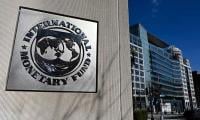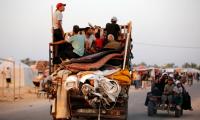Moscow: Russia on Friday said it would not impose a new lockdown despite reporting a record number of coronavirus deaths for the fourth day in a row.
A government tally showed 679 pandemic-related deaths in the previous 24 hours, as Russia battles a surging outbreak driven by the highly infectious Delta variant and worsened by a lagging vaccination drive.
Russia, the fifth worst-hit country in the world in terms of total cases, has refused to impose a full lockdown since the first wave of the pandemic last year. It continues to host mass events, including Euro 2020 football fixtures in Saint Petersburg.
The surge in infections prompted President Vladimir Putin again this week to urge Russians to get vaccinated in a televised phone-in session with the nation. But the Kremlin said on Friday that a new lockdown was off the table.
"Nobody wants any lockdowns, and yes, it is not up for debate," Putin’s spokesman Dmitry Peskov told reporters. "It is not being discussed, which is why... we must all be vaccinated as soon as possible." Saint Petersburg, Russia’s second city, on Friday recorded 101 deaths, just shy of its record from earlier in the week of 119.
Organisers have said the Euro 2020 Spain vs. Switzerland quarter-final later Friday will go ahead despite the high infection rates, in front of thousands of spectators. Moscow’s mayor Sergei Sobyanin has said that the Delta variant, which was first identified in India, now accounts for 90 percent of new cases in the city. Authorities in the capital have introduced a host of restrictions. Sobyanin recently ordered offices to send home a third of their workforces, except employees who had been vaccinated, and said 60 percent of people working in the service industry must be fully inoculated by mid-August.
Moscow’s restaurants have been told to only allow indoors patrons who have been vaccinated or infected in the past six months. The Kremlin had set a goal of fully inoculating 60 percent of Russia’s population by September, but conceded earlier this week that it would not be able to meet that target, even though free jabs have been available since early December.
Russia, with 136,565 deaths from the virus, has the highest official toll from Covid-19 in Europe -- even as authorities have been accused of downplaying the severity of the country’s outbreak.
Meanwhile, The World Health Organisation said on Friday that Covid-19 tests should be carried out in schools -- even when no cases have been detected -- to avoid the "harmful" effects of remote learning.
Screenings in schools had previously only been recommended if a cluster of coronavirus cases has been identified, but the WHO now believes PCR or rapid antigen tests should be given even in the absence of symptoms among students and staff. "The summer months offer a valuable window of opportunity for governments to put in place the right set of measures that will help keep infection rates down and avoid resorting to school closures," Hans Kluge, WHO’s regional director for Europe, said in a statement issued together with UNICEF and UNESCO. He added that closing schools "as we have seen, have such a harmful effect on the education, social and mental well-being of our children and youth."
"We can’t allow the pandemic to rob children of their education and development," said Kluge, who has repeatedly called for countries in the WHO’s European Region to address dropout rates and health effects linked to distance learning.
In a related development, nearly half of Portugal’s population will be placed under night-time curfews again from Friday as the government seeks to rein in a resurgence in coronavirus infections, primarily due to the more contagious Delta variant.
Nearly four million people living in 45 municipalities including Lisbon and the Algarve, as well as major northern cities such as Porto and Braga, will not be allowed to leave their homes between 11:00 pm and 5:00 am under the new rules.
The move marks a reversal from the gradual reopening that Portugal had embarked upon in mid-March after suffering a severe wave of infections at the beginning of the year. "The situation isn’t comparable to the more difficult moments our country has faced during the past year and a half, but it’s deteriorating," said government spokeswoman Mariana Vieira da Silva, announcing the measures on Thursday.
Trump, 77, is charged with 34 counts of falsifying business records
Garcetti said a criminal case and indictment had been brought “and if there is any connection to state actors in...
Tehran has always said it had no plans to obtain nuclear weapons
“Both sides have been working together to ensure continued operation of Indian aviation platforms,” India’s...
“China is one of the pillars of the new world order,” Orban said
“We are putting maximum pressure on our partners to increase weapon deliveries,” Zelensky said







